 Petzlover
Petzlover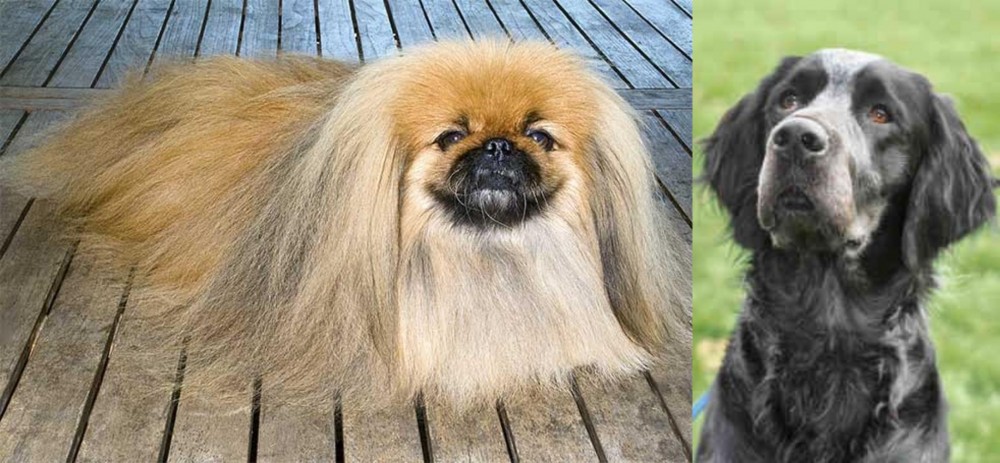 Pekingese is originated from China but Picardy Spaniel is originated from France. Pekingese may grow 16 cm / 6 inches shorter than Picardy Spaniel. Pekingese may weigh 18 kg / 39 pounds lesser than Picardy Spaniel. Both Pekingese and Picardy Spaniel has almost same life span. Pekingese may have less litter size than Picardy Spaniel. Both Pekingese and Picardy Spaniel requires Moderate Maintenance.
Pekingese is originated from China but Picardy Spaniel is originated from France. Pekingese may grow 16 cm / 6 inches shorter than Picardy Spaniel. Pekingese may weigh 18 kg / 39 pounds lesser than Picardy Spaniel. Both Pekingese and Picardy Spaniel has almost same life span. Pekingese may have less litter size than Picardy Spaniel. Both Pekingese and Picardy Spaniel requires Moderate Maintenance.
 This is an ancient dog breed that originated in China. Known also as Lion Dogs, they are toy dogs that have always been a popular choice for Chinese royals.
This is an ancient dog breed that originated in China. Known also as Lion Dogs, they are toy dogs that have always been a popular choice for Chinese royals.
DNA analysis tells us that these dogs are one of the oldest dog breeds there are and over the years, the dog has barely changed in looks.
The dogs found their way out of China, and as they started spreading to the USA and the UK, Pekingese clubs started emerging. A pekingese dog was registered by the American Kennel Club in 1906, and the Pekingese Club of America was formed in 1909.
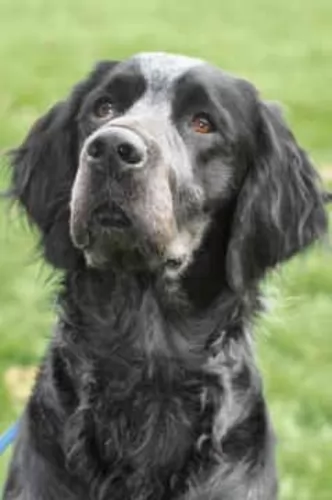 The Picardy Spaniel hails from France and has always been used as a gundog, having been crossed with different British hunting dogs.
The Picardy Spaniel hails from France and has always been used as a gundog, having been crossed with different British hunting dogs.
While this dog breed is related to the Blue Picardy Spaniel, the Picardy is the older of the two breeds. It has always been sought after by the French nobility for its hunting skills and the fact that its weather resistant coat allowed it to hunt in all kinds of weather conditions.
The dog’s popularity waned in the early 20th century. The UKC have recognized the Picardy Spaniel as a Gun Dog and the breed has also been accepted within the FCI as a Pointing dog group.
 The Pekingese is a dog which stands at between 30 – 45 cm and weighs anything from 3 to 7kg.
The Pekingese is a dog which stands at between 30 – 45 cm and weighs anything from 3 to 7kg.
His double coat can be fawn, cream, apricot, grey, or black or even a mix of some of these colors.
The Pekingese is known for its flat- or squashed face and his large, bulging type of eyes. His body is low to the ground and is somewhat longer than what it is tall. He has long, silky, feathery ears and his tail is plumed and essentially held over his back. The face usually has a black mask.
The Pekingese is a stubborn, independent, intelligent dog, but with his human family he is loving and loyal. People often look at the Pekingese and think that it is a delicate dog that just wants to sit on your lap and be cuddled. But this isn’t the case and the Pekingese is a dignified, robust, bold, confident dog. He is essentially an indoors dog though and will be content for a while to lie close to his human companion. He is calm and quiet indoors but is also game for some activity, being quite a playful dog.
The Pekingese is the kind of dog that will slot easily into city or country living. He gets on well with children but if he could choose, he would prefer to live with calm, consistent adults, as he doesn’t gel too well with raucous, undisciplined children.
He is a wilful dog and will require being trained and socialized to make him obedient and more amicable.
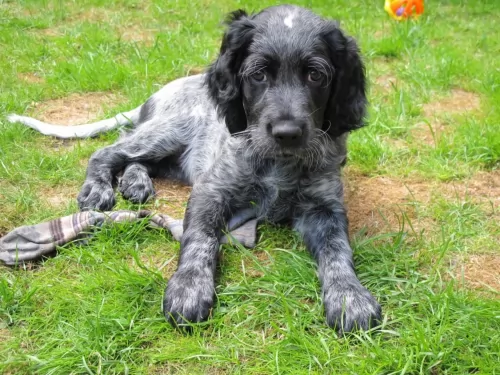 The Picardy Spaniel is larger than other spaniels. It is described as a medium sized dog, standing at 56 – 61cm in height and weighing between 20 and 25 kilograms. The body of the spaniel is squarely built and muscular body. The dog has long floppy ears and the coat which is shortish in areas except for feathering around the legs and belly can vary in colour from red to chestnut brown to sandy and chocolate. The tail is long and feathered.
The Picardy Spaniel is larger than other spaniels. It is described as a medium sized dog, standing at 56 – 61cm in height and weighing between 20 and 25 kilograms. The body of the spaniel is squarely built and muscular body. The dog has long floppy ears and the coat which is shortish in areas except for feathering around the legs and belly can vary in colour from red to chestnut brown to sandy and chocolate. The tail is long and feathered.
The Picardy Spaniel is a docile breed of dog and makes a great family pet, loving being playful with the children in the home and getting on well with other dogs. He is gentle but sociable and intelligent too and is easy to train and socialize.
Although he has been used as a hunting dog he can slot into life in the city or the countryside. He can be indoors or outdoors and still be happy, so long as his family members are close by.
He is an active dog though, and won’t be content to be sitting around for too long, loving nothing more than to be chasing a ball or going for a walk with you.
 Sometimes when his hair has grown long and he has a ribbon in it he may be looked upon as shallow, pathetic and nothing but lapdog. In reality his heart is brave, tough, dignified and confident.
Sometimes when his hair has grown long and he has a ribbon in it he may be looked upon as shallow, pathetic and nothing but lapdog. In reality his heart is brave, tough, dignified and confident.
All the Pekingese wants is to be a normal and loving pet for the right kind of person who appreciates all his strong characteristics.
He is capable of being quite lively and protective of his human family. Give him love and treat him kindly and firmly and you’ll find out why he is such a popular dog breed.
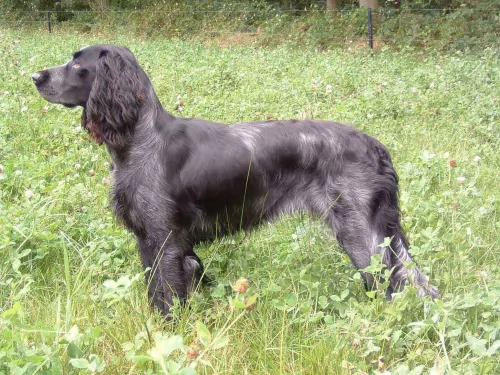 The Picardy Spaniel is a docile dog who forms strong bonds with his human family.
The Picardy Spaniel is a docile dog who forms strong bonds with his human family.
He doesn’t gel easily with strangers though, but socialization and training will at least make him well behaved among strangers.
A well-mannered Picardy Spaniel is a joy in the home, and this gentle dog is guaranteed to make you the most wonderfully loyal and loving pet and companion.
 The Pekingese can live to be between 10 – 15 years of age. One of the main medical problems with this dog is his squashed face which can be a source of breathing problems for him.
The Pekingese can live to be between 10 – 15 years of age. One of the main medical problems with this dog is his squashed face which can be a source of breathing problems for him.
The large, bulging eyes can also cause quite a few problems such as glaucoma, cataracts and eye ulcers. With Entropion the eyelid of the eye rolls inward and irritates the eyeball.
Your Pekingese shouldn’t be left outside as with his breathing problems, he isn’t good with regulating body temperature and can overheat in hot weather.
 Without any major health issues, your Picardy can reach 14 years of age and possibly even older. A couple of common dog conditions to be on the watch for include:
Without any major health issues, your Picardy can reach 14 years of age and possibly even older. A couple of common dog conditions to be on the watch for include:
Your beautiful Picardy Spaniel has floppy ears and this opens up the tendency to suffer with ear infections. The inside of the ears are moist and hot and you as the dog owner can try to keep the inside of the ear clean and dry.
He is a dog that loves water too, and swimming encourages dampness. If you prefer not to work on the inside of the ears, dog groomers or your vet can clean the ears for you. An ear infection can be painful for your pet and it will require veterinary intervention.
These are dogs which can pick up weight quite easily. Dogs which are overweight are more prone to developing cancer, diabetes and heart disease, not to mention joint problems.
Other problems to look out for include cancer, bloat, dental disease and parasites.
 Nothing is set in stone when it comes to the diet of your Pekingese or any other dog for that matter. How much a dog eats will depend on his breed, his age, his size and his activity levels.
Nothing is set in stone when it comes to the diet of your Pekingese or any other dog for that matter. How much a dog eats will depend on his breed, his age, his size and his activity levels.
Every dog is an individual and your Pekingese is too. Good food however dictates a lot on how healthy your pet will be so it will be to his benefit to give him the best quality commercially manufactured food there is.
He loves a bit of variety too so if you chop up some boiled chicken, brown rice and some wholesome vegetables such as carrots, spinach and sweet potato and add this to his kibble occasionally he will be delighted. He doesn’t want anything unusual or spicy because he can’t bear to have an upset stomach.
He must never be without a continuous supply of fresh, cool water.
The Pekingese doesn’t have serious exercise needs, and a little bit of running and exerting himself can have him snorting and grunting. A slowish walk outside will satisfy his exercise needs.
The coat of the Pekingese is long and thick and if you choose to keep it that way it will require brushing at least twice a week. Some people prefer to have the dog’s hair cut professionally as then it is easier to manage.
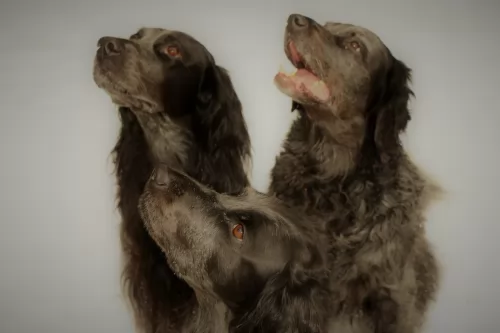 Your Picardy has a thick coat which sheds and the coat should be brushed at least twice a week to prevent matting. The ears of the Picardy Spaniel require special attention. Because they are long they will need to be cleaned and kept dry otherwise an ear infection can develop.
Your Picardy has a thick coat which sheds and the coat should be brushed at least twice a week to prevent matting. The ears of the Picardy Spaniel require special attention. Because they are long they will need to be cleaned and kept dry otherwise an ear infection can develop.
At the same time, check your pet over for ticks and fleas, check his eyes, keep the nails trimmed, and check inside his mouth for rotting teeth which can be the source of many health problems if left untreated.
If you have a puppy, you will need to provide 4 bowls of food in a 24 hour period. Check on the directions provided on the food packaging to see how much to feed your puppy.
By the time your Picardy is one year of age, he can move over to 2 bowls of food a day. Only the highest quality commercially manufactured food will be good enough for your dog. Food and its quality impacts the health and longevity of your pet.
Apart from dry kibble, try and provide some home-made food, keeping it as simple as possible. Dogs thrive on simple, consistent foods. Chopped up boiled chicken, brown rice, sweet potatoes, spinach and carrots added to the kibble now and then will thrill your pet. Occasionally you can also add in some raw meat.
Avoid feeding your dog things like coffee, chocolates, popcorn, nuts and onions as all these will just upset your dog's digestive system. The secret is to keep things simple and nutritious.
Make sure your pet always has access to fresh, cool water.